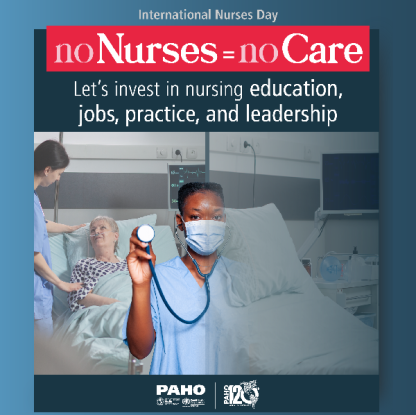
The COVID-19 pandemic has had a significant impact on health, life, and livelihoods in the Region of the Americas, causing a social and economic crisis marked by massive unemployment, impoverishment, and the worsening of longstanding inequities. The pandemic also exposed chronic underinvestment in human resources for health and the lack of systems with information on the deployment, makeup, and attributes of interprofessional health teams. As health systems have expanded, countries have found it difficult to hire, deploy, protect, and retain health workers, including psychosocial support for frontline workers (1).
In 2021, WHO adopted the document Global Strategic Directions on Nursing and Midwifery 2021–2025, covering four key policy areas: education, jobs, leadership, and service delivery (1). Its recommendations include: 1) educate enough midwives and nurses with competencies to meet population health needs; 2) create jobs, manage migration, and recruit and retain midwives and nurses where they are most needed; 3) strengthen nursing and midwifery leadership throughout health and academic systems; and (4) ensure that these staff are supported, respected, protected, motivated, and equipped to safely and optimally contribute in their service delivery settings (2).
In the Region of the Americas, nurses and midwives play an essential role in achieving health outcomes thanks to their experience, workforce size, and outreach in remote areas and among vulnerable populations and minority groups. However, challenges persist, such as scarcity (especially in remote areas), constant and increasing migration, unsafe and indecent working conditions, non-competitive wages, and lack of compliance or professional regulations.
The COVID-19 pandemic has increased the shortage of nurses and forced all countries in the Region of the Americas to implement emergency measures to expand the health services workforce. Data shows that around 4% of the workforce will leave the profession as a result of the pandemic. Migration and retention among professionals have been impacted due to physical and mental illness, excessive working hours and patient load, "burnout", and exhaustion (3).
Among the lessons learned is the need for a new approach, shifting from individual nurses who must "cope" and "be resilient", to employers and organizations taking responsibility for creating and maintaining supportive working conditions and adequate staffing (3).
A strong and sustainable increase in investment in training, practice, and regulations for nursing professionals will ensure better preparedness for health services in the event of new pandemics and may change the future of health care. Nurses play a leading role in managing the COVID-19 pandemic and public vaccination efforts. There is now an opportunity to translate recognition into real and sustained support.
Nurse leadership must be recognized. "Although nine out of ten nurses are women, only one-quarter of executive positions in hospitals are held by women," stated the PAHO Director in the editorial "COVID-19 has revealed a pandemic of inequality" (4).
A recent publication by WHO and PAHO indicates that the lessons learned during the pandemic provide evidence and help align policy priorities and objectives around protecting and caring for the human resources for health (HRH) workforce throughout the Region. Emphasis was also placed on the need to improve investment in HRH as a priority strategy to strengthen the resilience of health systems, ensuring continuity, optimal functioning, access, and adequate coverage for the entire population (5).
In celebration of International Nurses Day, PAHO again calls for collectively strengthening the nursing workforce through sustainable investment in education, jobs, leadership, professional regulation, and working conditions. This is also the theme of the International Council of Nurses' 2022 Campaign: "Invest in Nursing and Respect Rights to Secure Global Health."
References
1. Pan American Health Organization. Strategy for Building Resilient Health Systems and Post COVID-19 Pandemic Recovery to Sustain and Protect Public Health Gains [Internet]. 168th Session of the PAHO Executive Committee, 21-25 June 2021; Washington, D.C. Washington, D.C.: PAHO; 2021 (Document CE168/15) (https://www.paho.org/en/documents/ce16815-strategy-building-resilient-h…)
2. World Health Organization. Global strategic directions for nursing and midwifery 2021-2025. Geneva, 2021 (https://apps.who.int/iris/bitstream/handle/10665/344562/9789240033863-e…).
3. International Centre on Nurse Migration (ICN-GCFNS). The Global Nursing Workforce and the COVID-19 pandemic (Buchan J, Catton H, Shaffer F, eds.). Philadelphia, ICNM, 2022 (https://www.icn.ch/system/files/2022-01/Sustain%20and%20Retain%20in%202…).
4. Etienne CF. COVID-19 has revealed a pandemic of inequality. Nature Medicine, 2022, 28(1):17–17. (https://www.nature.com/articles/s41591-021-01596-z).
5. World Health Organization. Impact of COVID-19 on human resources for health and policy response the case of Plurinational State of Bolivia, Chile, Colombia, Ecuador, and Peru: overview of findings from five Latin American countries. Geneva, WHO, 2021 (https://www.who.int/publications/i/item/9789240039001).
To call for the importance of investing in nursing: education, work, regulation, and practice.
- Investing in the Nursing Workforce
- The strategic importance of investing in nursing professionals in the Region of the Americas
- Country experiences:
• Canada
• Brazil
• Jamaica
- Silvia Cassiani, Advisor on Nursing and Health Technicians, PAHO/WHO
- Jarbas Barbosa, Assistant Director, PAHO/WHO
- James Fitzgerald, Director, Department of Health Systems and Services, PAHO/WHO
- Daniel Salinas, Minister of Public Health of Uruguay
- Nancy R. Reynolds, Professor and Associate Dean of Global Affairs, Johns Hopkins University School of Nursing, PAHO/WHO Collaborating Center for Nursing Knowledge, Information Management, and Sharing, USA
- Gail Tomblin Murphy, Vice President, Research, Innovation and Discovery and Chief Nurse Executive, Nova scotia Health
- Sonia Acioli, President of the Brazilian Nursing Association (ABEn)
- Patricia Ingram Martin, Chief Nursing Officer, Ministry of Health and Wellness

